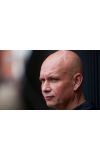
30 Jun 2013 00:33:31
Overexcitable publishers like to bandy around words such as "explosive" and "shocking" when trying to flog their books, even though generally you could substitute them for ones such as "mildly interesting". Not with Undercover, though. Subtitled "The True Story of Britain's Secret Police", and doggedly written and researched by Guardian journalists Rob Evans and Paul Lewis, the revelations in its pages are genuinely explosive. And even though a lot of the material was in last week's news and formed the basis of a Channel 4's Dispatches, reading it line by line, deception by deception, is genuinely shocking. It boggles my mind that this has been going on in our name, sanctioned by our state, paid for with our taxes. To recap, briefly, for those who have been under a stone, Evans and Lewis revealed last week that undercover police officers were asked to find "dirt" on the family of Stephen Lawrence in order to smear and discredit them. What's more, they alleged that one of the authors of the McLibel leaflet, the subject of the longest civil trial in British history, costing McDonald's millions of pounds in legal fees, was another undercover police officer.
"As our cops are shamed by cover-ups and corruption," said a headline in the Sun, that well-known voice of anti-establishment dissent, "We ask: can we ever trust them?"
It's a fair question, and one that would be interesting to ask people before and after they've read the book. Because it's the steady accumulation of detail that's so compelling. The testimony of person after person who was taken in, deceived, gulled, who knew the officers for years – who thought of them as best friends, or lovers, or life partners, or the father of their children, who had no inkling that they were part of an elaborate state-sponsored spy-ring that intruded on the most intimate parts of their lives. And who, in most cases, had done nothing more nefarious than be a member of a peaceful protest group, and some of them not even that.
The officers involved worked for the Special Demonstration Squad (SDS), a top-secret unit within special branch that was formed in 1968. Its unofficial motto was "By Any Means Necessary" and an officer called "Pete Black", the whistleblower who was the source for many of the revelations about how the unit operated and who unmasked himself last week as Peter Francis, relates how sex was just another tactic. "Basically," he tells them, "it's just regarded as part of the job."
The allegations about the Lawrence family were what made the headlines last week – another terrible blow after so many terrible blows. But it's the revelations about the women who were involved with these officers that I can't get out of my head. There is much else: the dead children's names that were stolen, the breakdowns suffered when officers discovered they couldn't simply return to their "real life", the often hilarious detail of spycraft gone wrong (the activist pals of one undercover officer give him the nickname "detective inspector"; another is "Lynn the cop").
But it is the women who are the emotional heart of this book and it is hearing from them, the victims in all this, in their own words, that gives it such power. "Charlotte", who recounts how she got home from work on 14 June last year, sat in the garden to read the Daily Mail with a cup of coffee and spotted a photo of Robert Lambert or, as she knew him, Bob Robinson, the father of her child, who she had not seen for 24 years. "And there was his face staring back at me from the paper. I went into shock, I felt like I couldn't breathe and I started shaking." She has subsequently received psychiatric treatment.
Or Helen Steel, who met John Dines, aka John Barker, and had a relationship with him for two years. "He said he wanted to spend the rest of life with me. In a short space of time I fell absolutely madly in love with him in a way that I had never fallen in love with anyone before or since."
Or "Alison", a secondary school teacher who lived with Mark Cassidy for four years, but who she subsequently discovered was using her as a ploy to get close to activist groups whose mission was – irony alert! – to uncover allegations of police corruption. And then he vanished from her life.
"How much of the relationship was real?" she asks. "I have, for the last 13 years, questioned my own judgment." And the targets of these elaborate and devastating intrigues? They were "50-year-old vegan cake-makers", members of the Clandestine Insurgent Rebel Clown Army, a pensioner who didn't want his local duck pond filled with ash. And, while this may be the "true story" of the secret police, it's almost definitely not the whole story. At the end of the book, Evans and Lewis estimate there may be 100, even 150 more covert officers out there.
A few weeks ago, I wrote in another article that books don't change anything any more. Now I'm hoping I was wrong. And when it's the Sun that points out that the police are looking "less like the long arm of the law and more like an organised conspiracy against the people they are meant to protect", it's surely time that someone – the PM? Parliament? Us? – changes something.

